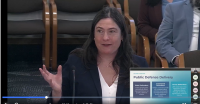

On this edition of Prison Pipeline: School Suspensions Fail Kids.
School suspensions have risen in many parts of the country in recent years. This trend threatens long-running efforts to reform school discipline and to develop restorative justice strategies centered on children’s mental health. It’s also prompted new worries over widespread and persistent racial disparities in how schools punish kids. There are gender gaps: Black girls had the highest rates of “exclusionary discipline” in public schools. Autistic students and students with mental health issues are more likely to be suspended as well. Many school districts are also struggling with persistent staff shortages — particularly special education specialists, aides and resource staff. These schools are less able to intervene to help support children in crisis and instead are more likely to have higher suspension rates.
On this edition of Prison Pipeline we’ll hear more about this from Rachel M. Perera, PhD, is a fellow in the Governance Studies program for the Brown Center on Education Policy at Brookings whose research examines how racial and socioeconomic inequalities develop in K-12 education and the consequences of policies designed to reduce educational inequality. She took part recently in a webinar hosted by the USC Annenberg Center for Health Journalism entitled Suspended: Student Mental Health and Unequal Discipline.
Plus, we’ll hear an update on Oregon’s ongoing public defense crisis from Jessica Kampfe, Executive Director of the Oregon Public Defense Commission. She testified January Twenty-Third at an informational hearing in a joint meeting of the Legislature’s House and Senate Committees on the Judiciary.
- KBOO

